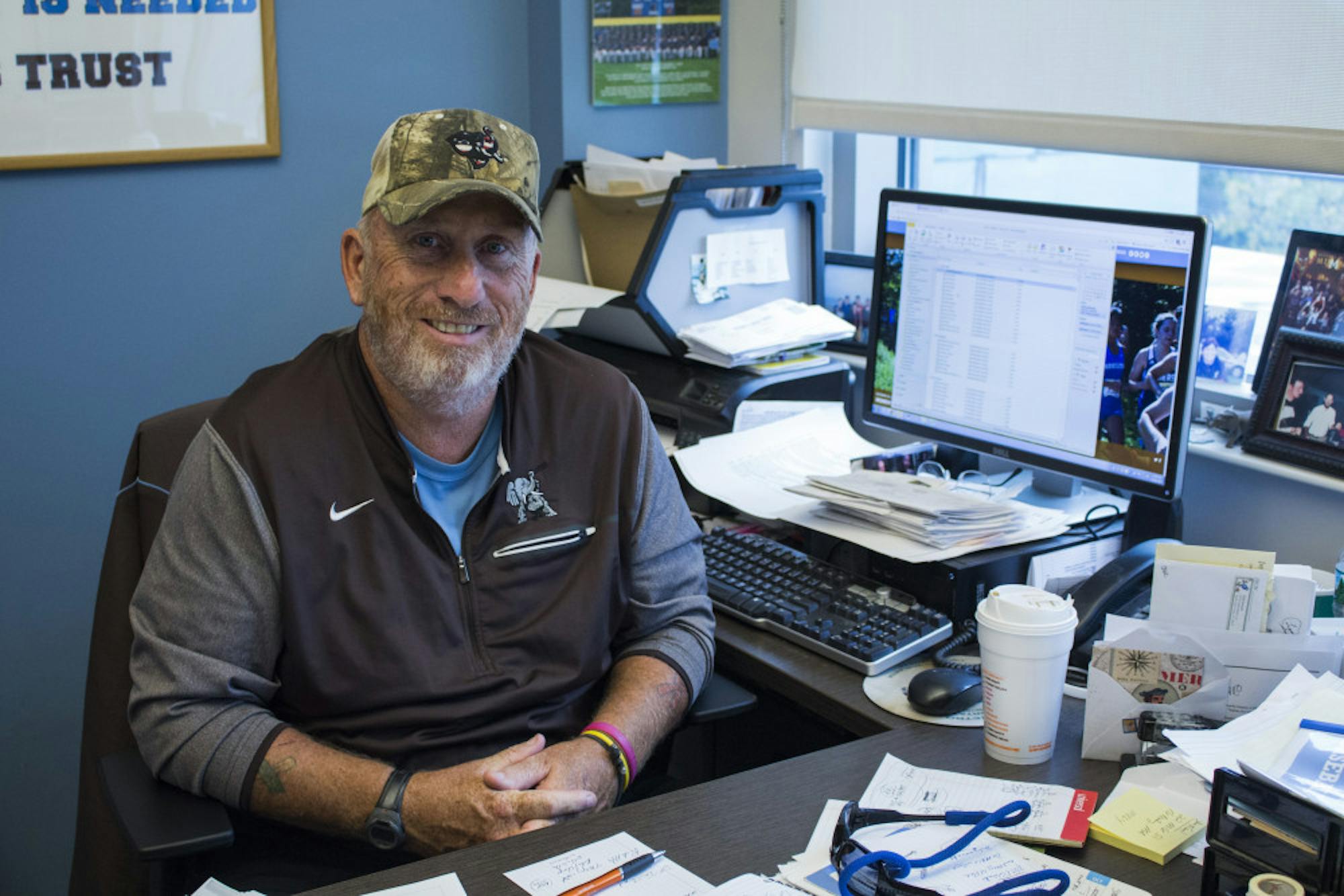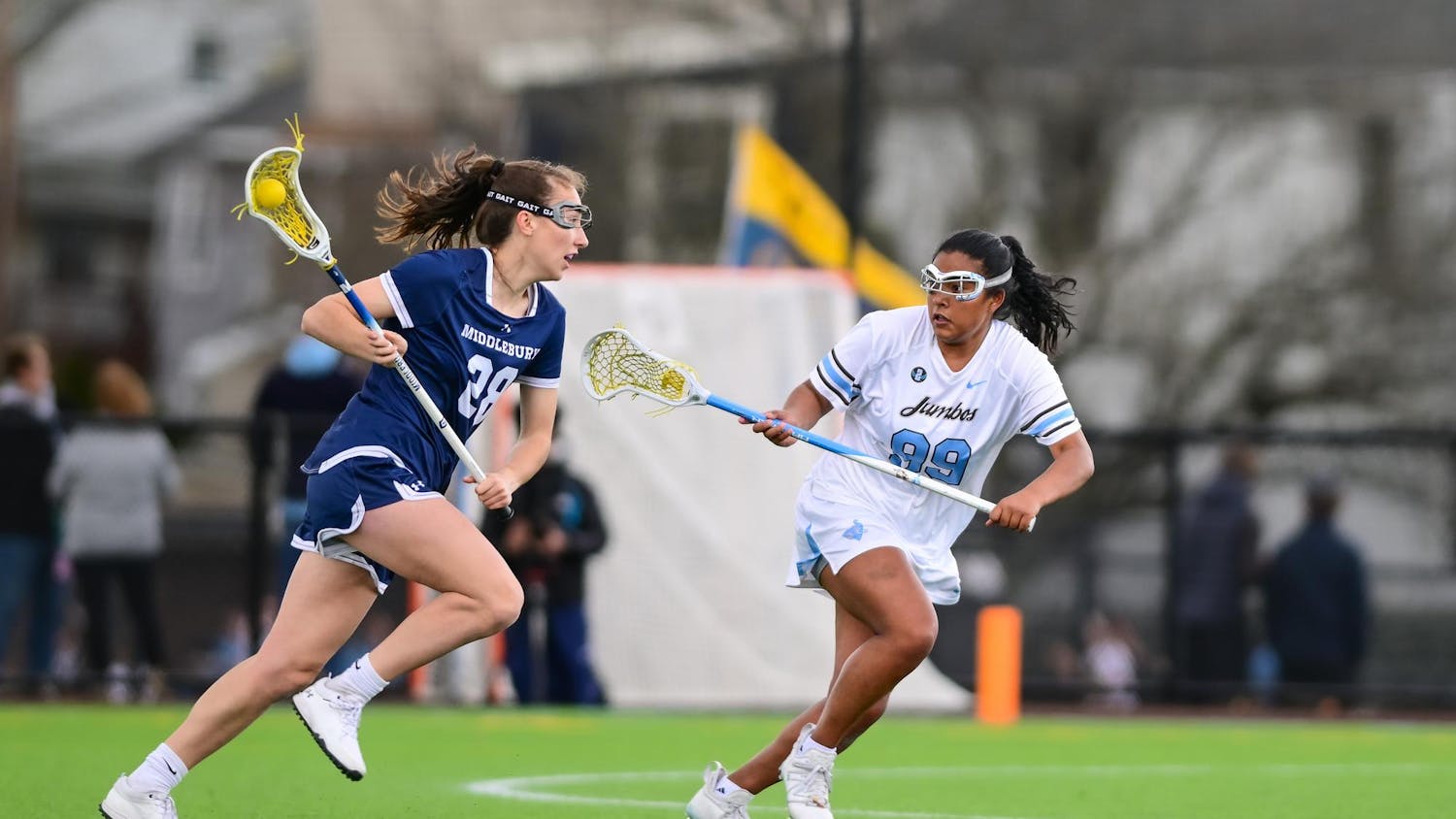John Casey has been a figure in Tufts athletics for longer than many coaches, and almost all students, have been alive. He began his Tufts career when he arrived on campus in 1976 as a first-year recruited to play football and baseball for the Jumbos.
Growing up in the Boston area, Casey was a year-round athlete for his entire life. Casey explained that despite being recruited by numerous schools across the country to play football, Tufts' proximity to home was what led him to come to school here.
“Back then, in terms of recruiting, people didn’t really look at schools until their senior year," Casey said. "So I was recruited by Paul Pawlak, who was the football coach here. Like any guy you had this wide gamut of schools you are looking at, and Tufts was one of them. It was all over the place, from Wisconsin to Princeton to Dartmouth to Tufts to Middlebury. Being brought up in the city, I didn’t really relate to Dartmouth or Middlebury or Wisconsin … Somewhere in the back of your mind, the fact that my parents could get here or I could get home factored into it. So I wound up here in fall of ‘76.”
Even with the challenge of playing multiple sports and being a student, Casey found great success during his time at Tufts. His pitching led the Jumbos to back-to-back ECAC Division II-III Tournament appearances, and he also started at tight end for the 8–0 1979 Tufts football team. Casey discussed what it was like playing multiple college sports when he attended Tufts.
“It was much more commonplace than it is now," Casey said. "I don’t think that changed until about 10 or 15 years ago. There were probably seven or eight guys on the baseball team that played football. You just went from one season to the next it was no different from high school. I’m not so sure that’s not a bad thing. I think often people specialize way before they’re ready to make a choice. The struggle you had was August when all your friends were going to the beach and summer baseball had ended and you had to start getting ready to be in shape for football. That was a tough month, but you did it, because you just wanted to compete.”
Although he may not have anticipated it, Casey’s coaching career began even before his playing one ended. Because of an injury during his undergraduate football days he had been forced to miss all of one baseball season, and had an extra year of eligibility after graduation. Casey spent his first year out of college as a grad student at Tufts, assistant coaching football in the fall and playing baseball in the spring.
Casey credited this year of his life for giving him perspective into all the hard work and preparation that goes into every different layer of a college sports team.
“After being in the fall playing, and then coaching, it was just a really interesting dynamic to be in the middle," Casey said. "But it made me think a lot about both sides. I think I was much less tolerant of my other teammates that spring in baseball, because I had seen the coaches' side of it. I remember just being more of a hardass, for lack of a better word, and telling guys 'hey c’mon run your sprints harder' because you had seen the other side so you appreciated how much work they had put in. Like anything in life if you see both sides you have a better appreciation for it … So I was fortunate enough to get the whole picture of coaching and playing in the same year.”
Following a brief stint working at a high school, where Casey coached football, women’s basketball and baseball and also taught at the school, he returned to be an assistant coach for the Tufts football and baseball teams. Luckily for him, the head coaching job opened up for baseball just a year later, in 1984, and Casey took over the program.
Casey quickly noticed a stark contrast in what it was like to be a head coach versus an assistant coach.
“Night and day," Casey said. "When the game’s over and it’s a tough loss, I’m hoping my guys can hold a loss from [the field] to the bridge. Then they’ll shake it off cause they’re college guys, they’re 19 years old. I think the assistants hold onto the loss as long as I’m buying dinner, and then after dinner it’s gone for them. The only person who stays awake at night is the head coach, because it all falls on you.”
Casey has held the baseball head coaching job ever since and has won over 600 games in his career. As to why he has stayed at Tufts for so long, Casey credited the people he has met and culture he’s helped create.
“I have had several opportunities to go, I’ve just felt at home here," Casey said. "We’ve had awesome guys … In terms of staying here, some of the best people I’ve ever met came here. One of [the] former players who was then a graduate assistant is my youngest son’s godfather. I just thought that Tufts is a place that changed people’s lives. You have these older more established [schools] that are about the institution, but I’ve always thought Tufts was about the people.”
His accomplishments have been noted by most of the baseball community as well, as Casey has served most recently as the president of the American Baseball Coaches Association in 2016.
Casey described the experience of serving in this position as one of the best of his life.
“I’m around guys who started this game … I’m sitting around guys in the room that started the college world series," Casey said. "So when I’m sitting in that room with them I pinch myself that I’m in the room with them … I can’t fathom a better situation to do. You really get to affect the game of baseball, and it’s pretty neat. We try to get younger coaches involved to make sure that they’re taking care of the game.”
Current Tufts senior infielder Tommy O'Hara, one of the captains of the baseball team this year, spoke about how Casey has impacted his time at Tufts.
“His knowledge of the game is incredible, the things that he knows, this is my fourth year with him and there is still new stuff I’m getting out of him," O'Hara said. “He’s helped me a lot, all of us. There have been whole generations of Tufts baseball players, he has really invested in making us great players and even better men. I can’t thank him enough."
O'Hara also noted that the success Tufts baseball has enjoyed over the past few years, including winning the 2016 NESCAC championship, has been largely due to the culture of the team set by Casey.
“We have a very gritty, tough culture, and that starts with him. We play very blue collar baseball, our goal is we’re going to out-hustle you and have a great attitude and compete hard," O'Hara said. "That’s why we don’t get out of the way of pitches, we pride ourselves on being tougher than most teams ... We pride ourselves on team first.”
Casey and his family now live in Milford, Mass. With four children who followed him into the coaching world, Casey has made his coaching role at Tufts a large part of his family and life. Each of his sons is now assistant coaching baseball, with one at William & Mary, one at Northeastern, one at Roger Williams and one at Tufts. He noted that integrating his family life and coaching life together was the only way to make time for both.
“They saw all the good stuff, guys competing, players at my house for a breakup dinner having fun and talking about the stories, they saw our alums come back and come over to the house ... They saw all this stuff and they just thought it was cool,” Casey said. “Part of it is that you have to integrate your family and your team together because if you don’t there’s just not enough time.”
From player to coach: 41 years of Tufts baseball

Coach John Casey, associate athletic director of Tufts, poses for a portrait in his office at the Steve Tisch Sports and Fitness Center on Oct. 26.





